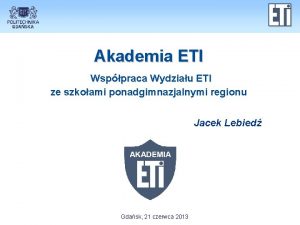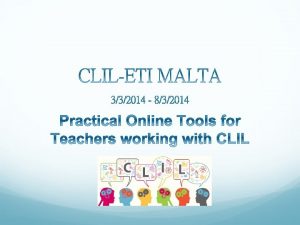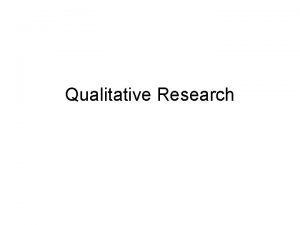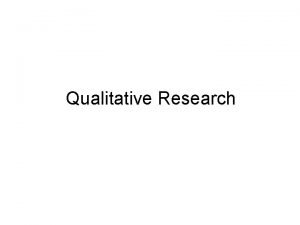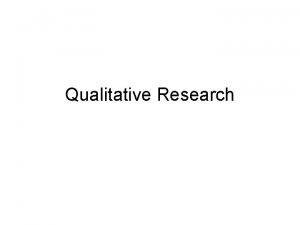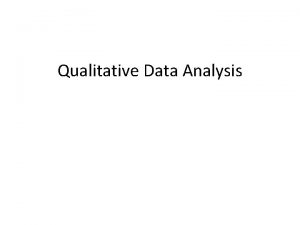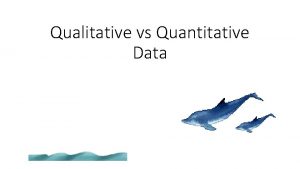Ethical Challenges in Qualitative Resesarch Dr Eti Poncorini



























- Slides: 27

Ethical Challenges in Qualitative Resesarch Dr. Eti Poncorini Pamungkasari, dr, MPd Bagian IKM; Unit Pendidikan Kedokteran Fakultas Kedokteran Universitas Sebelas Maret Surakarta

Ethics? Ethical behavior? • Ethical behavior represents a set of moral principles, rules, or standards governing a person or a profession

• Qualitative researchers do not have clear standards governing their activities. • Universities rely on review boards to decide which research activities to approve. • Unfortunately, not all ethical committees have committee members who understand qualitative research

The ethical challenges in qualitative research (Donre and Sankaran, 2015) Ensuring confidentiality Selecting a tool and an approach for studying sensitive topics Developing a consent form for a flexible interview Addressing risks Ethical reviewing of qualitative research proposals Publishing qualitative research findings

Major principles of qualitative research ethics Do no harm Privacy and anonymity Confidentiality Informed consent Developing rapport intrusiveness Inappropiate behaviour Data interpretation Data ownership and rewards

The researcher and participant relationship • The relationship and intimacy that is established between the researchers and participants in qualitative studies can raise a range of different ethical concerns • qualitative researchers face dilemmas such as respect for privacy, establishment of honest and open interactions, and avoiding misrepresentations

Research design • Qualitative researchers involve interaction with individuals • Researchers can have difficulty because of the information; might be damaging to participant • The qualitative method is utilized to explain, clarify and elaborate the meanings of different aspects of the human life experience. • Researchers can interpret people’s experiences because they are involved in human activities. • The principle of ‘no harm’ to participants ought to be considered by researchers, who should be aware of the potential harms that might be inflicted upon study subjects.

Data gathering and data analysis • In qualitative research, data are collected with a focus on multifaceted interviews and narratives to produce a description of the experiences. • The researchers play the role of a mediator between the experiences of the respondents and the community of concerned people.

• The post interview comment sheet could assist the researcher to note the feelings of informants, as well as interpretations and comments that occurred during the interview. • Data collection needs to be as overt as possible, and findings should be recorded. • Although there is no guarantee of absolute confidentiality, openly recording field notes assists participants to decide what they wish to have on the record. • In health care research, the problem may be even more exaggerated as the researcher is sometimes the health provider as well

Enganging children as informant • Data obtained from children were viewed as unreliable and invalid because it was believed that children were too immature to understand their worlds, and lacked the necessary verbal and conceptual abilities to convey their experiences (Docherty and Sandelowski, 1999). • They were assumed to be suggestible and incapable of distinguishing between fantasy and reality (Punch, 2002 a). • However, there is now a growing body of evidence that demonstrates that children can be competent participants in the research process as long as researchers recognise the ways in which children communicate and facilitate their participation (Mauthner, 1997; Thomas and O’Kane, 1998).

Differences and similarities in conducting qualitative research with children and adults (Kirk, 2006)

Confidentiality • According to Richards and Schwartz’ findings, the term ‘confidentiality’ conveys different meanings for health care practitioners and researchers. • For health care practitioners, confidentiality means that no personal information is to be revealed except in certain situations. • For researchers, however, the duty of confidentiality is less clear and involves elaboration of the form of outcome that might be expected from the study • the identity of the participants must be protected at all times and not be left lying around in notebooks or un-protected computer files.

Case in a phenomenological study the researcher actually wanted to find information about the quality of health services, but accidentally get information from a patient about the sexual abuse she experienced from health workers Confidentiality?

Informed consents • For qualitative researchers, it is of the utmost importance to specify in advance which data will be collected and how they are to be used. • The principle of informed consent stresses the researcher’s responsibility to completely inform participants of different aspects of the research in comprehensible language.

Informed consent The nature of the study The participants’ potential role The identity of the researcher and the financing body The objective of the research How the results will be published and used.

Informed consent • Many people consider it necessary to participate in research that their peers, community and/or society may benefit from. • Qualitative health researchers need to clarify that the research they carry out will benefit science and can contribute to the improvement of health policy

Case a qualitative researcher will observe the foodcourt visitors in the mall about handwashing behaviour before conducting in-depth interview with them Informed consent?

No harm • Researchers have the responsibility of protecting all participants in a study from potentially harmful consequences that might affect them as a result of their participation.

Case A qualitative researcher will conduct in-depth interviews on children victim of sexual abuse and their family No harm?

Privacy and anonymity qualitative researchers use transcriptor that apparently recognize the voice of the interviewee Anonymity?

Intrusiveness • Informants’ time • Informants’ space • Informants’ personal lives

Inappropiate behavior • Individuals participating in a research study have a reasonable expectation that the researcher will not engage in conduct of a personal or sexual nature

Data interpretation • A researcher is expected to analyze data in a manner that avoids misstatements, misinterpretations, or fraudulent analysis.

Data ownership and rewards • who actually owns such data? • Several ethnographers have shared a portion of their royalties with participants.

Publishing qualitative finding A qualitative researcher will publish the results of his research on the quality of care in Hospital X. Does the publication need to state the name of the hospital clearly?

Conclusion Qualitative researchers need to pay attention to the various stages in his research that may lead violations to ethical clearance, such as: informed consent, confidentiality, privacy and anonymity, no harm

References • Kirk, S. (2007) ‘Methodological and ethical issues in conducting qualitative research with children and young people A literature review’, 44, pp. 1250– 1260. doi: 10. 1016/j. ijnurstu. 2006. 08. 015. • Dongre, A. and Sankaran, R. (2016) ‘Ethical issues in qualitative research: challenges and options’, International Journal of Medical Science and Public Health, 5(6), p. 1187. doi: 10. 5455/ijmsph. 2016. 19102015179. • Almark, PJ, Boote, J, Chambers, E, Clarke, A, Mc. Donnel, A, Thompson, A, Todds, A. ‘Ethical issues in the use of in-depth interviews literature review and discussion’ (2009), 5, pp. 48– 54. • Grinyer, A. (2009) ‘Update The ethics of the secondary analysis and further use of qualitative data’, (56). • Halai, A. (2006) ‘ETHICS IN QUALITATIVE RESEARCH Plenary Address Multi Disciplinary Qualitative Research Ed. Qual Working Paper No. 4’, (4), pp. 1– 13. • Kara, H. and Pickering, L. (2017) ‘New directions in qualitative research ethics’, International Journal of Social Research Methodology. Routledge, 5579, p. 0. doi: 10. 1080/13645579. 2017. 1287869. • Munhall, P. L. (1988) ‘Ethical Issues in Qualitative Research. ’, Western Journal of Nursing Research, 10(2), pp. 150– 162. doi: 10. 4135/9781483384511. n 5. • Orb, A. , Eisenhauer, L. and Wynaden, D. (2001) ‘Ethics in Qualitative Research’, (1994), pp. 1994– 1997. • Roberts, L. D. (2015) ‘Ethical Issues in Conducting Qualitative Research in Onlinen. Communities’, Qual. Res. Psychol. , 12(3), pp. 314– 325. • Sanjari, M. et al. (2014) ‘Journal of Medical Ethics and History of Medicine E thical challenges of researchers in qualitative studies the necessity to develop a specific guideline’, pp. 1– 6. • Scales, K. (2012) ‘Ethics in practice: Considering ongoing ethical issues in qualitative research’, (March). • Stevens, M. (2013) ‘Ethical issues in qualitative research Research ethics’. • WHO-CIOMS. 2016. International Ethical Guidelines for Health-related Research Involving Humans
 Procedural rigour
Procedural rigour Positive and negative effects of globalization
Positive and negative effects of globalization Security and ethical challenges
Security and ethical challenges Security and ethical challenges
Security and ethical challenges Chapter 4 business ethics and social responsibility
Chapter 4 business ethics and social responsibility Ethical habits
Ethical habits Perbedaan ethical dilemma dan ethical lapse
Perbedaan ethical dilemma dan ethical lapse Army ethical reasoning model
Army ethical reasoning model Ethical issues in qualitative research chapter 4
Ethical issues in qualitative research chapter 4 Transvers sırt diş
Transvers sırt diş Environmental training institute (eti)
Environmental training institute (eti) Eti kram
Eti kram Eti conformity services
Eti conformity services Eti-kj
Eti-kj Myelositer seri
Myelositer seri Akademia eti
Akademia eti Eritrolösemi
Eritrolösemi Eti base code
Eti base code Andrea baule
Andrea baule Isef eti
Isef eti Acronyme eti
Acronyme eti Transvers sırt diş
Transvers sırt diş Sae
Sae Eti winter tech week
Eti winter tech week Eti malta
Eti malta Banket organizasyonu nedir
Banket organizasyonu nedir Eti isef
Eti isef Eti swot analizi
Eti swot analizi















